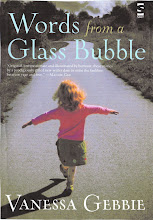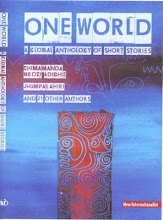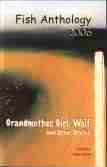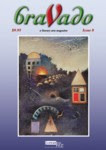

Today I am hosting the next stop in Elizabeth Baines Cyclone blog tour for her superb collection of short stories
Balancing on the Edge of the World(Salt Publishing) I feel close to this book… a few times, Elizabeth and I were reviewed together, and I found that a real privilege! Then we met several times, at bookish things, and I enjoy her company as much as her work!

So -what to ask? I am fascinated by the mechanics of writing, whether they are mental mechanics or otherwise… so I dived in, knowing that the stories I wanted to talk about had already been aired… so I was hoping to get something different out of the writer!
I'd like to start with your use of metaphor, because to me, that is one of the striking things about your work. I know we could go on all day... so let's focus on one story: Compass and Torch, perhaps? I loved this story... thematically it chimes strongly with me. And the whole journey becomes a metaphor doesn’t it? But the tools themselves, the compass, the torch. When the father realised he had left his compass behind... that was an almost physical jolt for this reader, followed by the attempt of his son to be like his Dad, even in the negative, underpinning the vastness of the loss surrounding him. Did you do this consciously as you wrote, or is this something that happens subconsciously?Well, I’m really pleased that you like the story so much! This question follows on in an interesting way from what I said about ‘Compass and Torch’ last week on
Sarah Salway’s blog , in particular the fact that I did actually see a young boy and his father setting off on a camping trip like this. In the past I have tended to resist talking about which elements of my work relate to ‘fact’ or ‘real life’, not least because, as I am always saying on my blogs, it encourages reductive biographical readings of one’s work as a whole. However, it seems inevitable for some of the discussions I’m ending up having on this tour, and acknowledging the fact that I actually saw a similar boy and his dad to the ones in this story is essential to an explanation of how the symbolic elements of the story emerged.
The truth is that when I saw the real-life pair my partner John and I had also just parked our car to go for an evening walk in Wales. I was waiting for John to put his boots on when their car approached the gate. Now something about them immediately arrested my attention, and I was riveted by everything that happened, which it did in the same way as in the story – even down to the horses – although I couldn’t actually hear what the boy and his father were saying. John decided to look at the map so I was still standing watching them when they were disappearing over the top of the nearby hill, by which time, I will confess, I was crying: John looked up and found me with tears streaming down my face. Which of course was when I realized that what they had triggered was my own memories – both of my own childhood and of my divorce and the way it affected my children. Everything in that scene - the way the sun and clouds seemed to open up curtains on the landscape and then close them again, the horses softly watching, the torch, and above all the darkening vastness of the evening landscape across which they had to walk – all of these things hit me in the gut and tugged on my own memories and emotions. I couldn’t stop thinking about the scene afterwards, and these things were the essence of it, and would therefore be the essence of the story I would eventually write. But it was a gut thing entirely, at that stage, and it was only as I began to formulate the story that I came to see that they were symbolic: of the start of the journey into a new life of loss and loneliness, of the vastness of the struggle ahead, the way the father and son would now only ever be able to ‘camp’ in each others’ lives, the struggle for emotional direction, the lack of emotional equipment for the situation and the shutting down and turning away from emotion. The compass was something I introduced into the story myself, and it now seems such an obvious symbol, but the fact is that I couldn’t actually see that until it was already in the story, and even then I wasn’t fully aware right away of its significance. I remember considering stopping to think about whether or not it worked as a symbol, but then not bothering because it FELT right, and anyway I didn’t want to interrupt that instinctual ‘flow’ which is always for me (as I said on
Barbara Smith’s blog ) the first stage of writing. Trusting your gut instincts is the most important aspect of writing for me. I don’t think it’s luck or coincidence that those elements of the scene turned out to be so symbolic once they were in the story: I had already, subconsciously, made them symbolic of the emotional aspects of my own memories. And although I had no rational understanding of their symbolism at that stage, because they were so emotionally powerful for me I just knew to trust them when I embarked on the writing.
And so that’s my answer: that the symbols aren’t thought up consciously, but arrive more instinctually as the emotional substructure of a story. And here’s how subconscious they can be: it was only after
‘Compass and Torch’ was published that I realized the symbolic significance of the ambiguous first sentence: ‘The road ends at a gate.’
 Dorothea Brande embodied! It is lovely to find reality mirroring theory! And leading on from the above. I find your child characters absolutely compelling. (Maybe because I am a big kid myself…) But it is because I think, they are acting out scenarios that mean a lot to me. Much of the excellent characterisation is thanks to the voices you use/create. Star Things, Leaf Memory, and Power... the young characters are almost physically reaching out, speaking authentically. Talk to me a bit about voice, about how you get inside the head of a much younger person, and why you find this a successful way to write.
Dorothea Brande embodied! It is lovely to find reality mirroring theory! And leading on from the above. I find your child characters absolutely compelling. (Maybe because I am a big kid myself…) But it is because I think, they are acting out scenarios that mean a lot to me. Much of the excellent characterisation is thanks to the voices you use/create. Star Things, Leaf Memory, and Power... the young characters are almost physically reaching out, speaking authentically. Talk to me a bit about voice, about how you get inside the head of a much younger person, and why you find this a successful way to write.It’s interesting that people have picked up on the stories in the book that take the viewpoints of children -
Clare Dudman did, too, when I visited her blog – and it’s very gratifying to me that you find their perspectives authentic, especially as you have adopted the voices of young people so movingly in your own stories! I did talk a bit on Clare’s blog about the voice in these particular stories of mine, but your HOW question gets to the crux of it. The key, I think is memory: quite simply, remembering, never forgetting what it was like to be a child – and I think it’s significant that you, a writer, call yourself a ‘big kid’! I have to say that when I was in my early twenties I made a conscious vow, for the sake of the children I had begun teaching and my own future children, never to forget what it was like to be a child and suffer the casual injustices of adults who did seem to have forgotten, and therefore to hang on tight to those childhood memories. But I do also happen to have a very good memory: since I’m in for a penny on this interview, I’ll confess that the story
‘Leaf Memory’ is based on a real-life memory of my own, aged two years and two months, the age I was when my sister was born. Of course, the way children experience the world is sensual rather than intellectual, in terms of sight, sound, touch etc (and this story is actually about that: the different perceptions of children and adults), so if we can remember what it’s like to be inside a child’s head, any story we produce from there has a good chance of being vivid. But remembering what it’s like to experience the world in that way, on the sensual level, or rather continuing to do so, is an author’s best equipment for any writing, not just writing about children: it’s the basis of show not tell. Who was the famous author who said that: that the writer should always stay in touch with their childhood self? I knew once who it was, but I’ve forgotten (so much for my supposed great memory!) and I can’t find it anywhere. In any case, I think it’s one of the great truisms about writing.
 Condensed Metaphysics has to still be my favourite story. I was hugely surprised when you said somewhere that it was based on a real incident. This is a te chnical question... seeking something of a masterclass for the blog! HOW do you take a real incident, and turn it into fiction that works? newer writers are told not to rely too heavily on fact, as it is very difficult to transform fact into engaging fiction. HOW did you prevent that incident taking over the piece, set in concrete, and swamping the story?
Condensed Metaphysics has to still be my favourite story. I was hugely surprised when you said somewhere that it was based on a real incident. This is a te chnical question... seeking something of a masterclass for the blog! HOW do you take a real incident, and turn it into fiction that works? newer writers are told not to rely too heavily on fact, as it is very difficult to transform fact into engaging fiction. HOW did you prevent that incident taking over the piece, set in concrete, and swamping the story?I think it’s in shreds now, don’t you, my vow to avoid talking about the real-life triggers of my writing? But yes, I have already confessed on one of my blogs that ‘Condensed Metaphysics’ was based on a real-life incident. The question you’ve posed is a huge one to answer, because once you’ve written a story it’s often hard to remember oneself where the real-life bits and the imagined bits join: they bleed into each other and become something else altogether, richer and more complex - which, as I say, can be denied and reduced by discussions about the various ‘components’. However, perhaps an in-depth discussion will indeed show up the complexities.
In fact the bones of this story – the events – closely follow what happened in real life, or at least what I remembered afterwards happening, and in many ways it felt like a ‘found’ story. But of course, as you say, you are never really lifting anything wholesale; you are always shaping – selecting and adding and tweaking by pointing up connections - to make a story. So HOW did I do this here? Let me see. Well, I was indeed out on the town with a group of friends: we’d been to a poetry reading where the wine had flowed freely, and, like the gang of friends in the story we were all a bit drunk. And my friend who shall remain nameless did indeed, like Ellie in the story, lead us all off for a pizza and then remember she had no money and with drunken irony ask a guy begging outside the pizza place to lend her some. And he did respond in just the way the guy in the story does, he was just as philosophical, and they had a similar philosophical conversation. Really, it was just too comically (and movingly) good to be true for a writer, though I must say that, with a few glasses of wine inside me, I wasn’t consciously thinking that at the time, I was just hugely entertained. Just like Ellie in the story, she did promise that we’d get him a pizza, and she did then forget and try and make us all donate a slice of our own pizzas to him, and then, ironically, he had disappeared anyway by the time we got outside. The people in the pizza parlour in the story were indeed the people in the real-life takeaway, as far as I perceived them, and, most crucially, my friend did strike up a drunken conversation with the researcher, and we did all think at first that he’d said he was researching ‘condensed metaphysics.’
Now that was a just wonderful gift – that phrase so fortuitously linking with the philosophical bent of the homeless man, but I suppose it was up to me as the writer to notice the connection and see how it could be the focal point, the basis of a story. It’s this sort of thing – the ideas and the images – that distinguish a resonant story from a mere series of events. I reckon that a writer should always keep the antennae out for them and it’s quite possible that subconsciously I was already shaping a story out of the experience even while I was in it. However, it was next morning as I was waking – and I think of lot of this sort of ‘gelling’ goes on while we’re asleep – that I consciously saw the connection, as well as another that could turn this into a complete story: I saw all of us in the pizza parlour – along with the homeless man outside – as a microcosm of society, and this suddenly linked for me with the notion of condensed-matter physics (the subject that the researcher was really studying, both in real life and in the story) which the real-life researcher did not in fact talk about at such length, but which I had read a bit about. The question of the relationship between the particles of solid matter, and the unresearched issue of what happens to it when outer forces are brought to bear on it struck me as a great metaphor for our relationships in society as a whole, for the potential stories of some of the pizza-place inhabitants (the pressures they had undergone in their lives), and for the effect they all had on each other in that one small but potentially significant incident. (I guess this was one story where a logical consciousness of the metaphorical underpinning preceded the writing, but it still felt ‘handed’ to me, partly from my subconscious as usual and partly, this time, from life.)
So that was it: with the motifs of philosophy/metaphysics and condensed-matter physics joined together in that one phrase ‘condensed metaphysics’, I was off on a story, pulling in all the things from real life that fitted – keeping my antennae so well and truly extended in order to eliminate those that didn’t that I now have no memory of them - and making up others. I elaborated the homeless man’s speech, I made the researcher talk more than he had in real life, and more philosophically, about condensed-matter physics, and of course the reactions of the other characters and their discussions about it followed on from that; in reality, although the old drunk had taken an interest in everyone’s pizzas just as in the story, he hadn’t said very much at all, but I developed the philosophy theme by turning him into a pizza-parlour philosopher and giving him a backstory to relate which was my pure invention, or more accurately, probably, pulled from somewhere else in the depths of my subconscious memory store. There were certain images which resonated deeply for me: the way we all moved back and forth in the mirrors around the wall, the pizza cooks tossing the coloured chopped vegetables and the lights of Chinatown which we looked towards when the homeless guy pointed in that direction, telling us he slept there. However, as with the images in
‘Compass and Torch’, it was only as I was writing them into the story that I came to see that they were kaleidoscopic images and thus appropriately symbolic of my particle-relationship theme. The seemingly weird thing is that these images were essential, even central, to my experience of the incident before I consciously saw it as a story, and I think this probably does indicate that even inside the experience my brain was already subconsciously turning it into a story and selecting appropriate images.
So there we are. And you, Vanessa, have succeeded in making me strip two of my stories naked in public for the first time ever!! But thank you so much for having me here to do it, and for paying such close attention to my work!
Elizabeth, thank you so much. I found your answers seriously interesting and I hope others will too. So often, writers sidestep those issues they find hard to address, the minutiae of their craft. It is lovely that you have been able to stand back and dissect the process for us.
















.JPG)






















